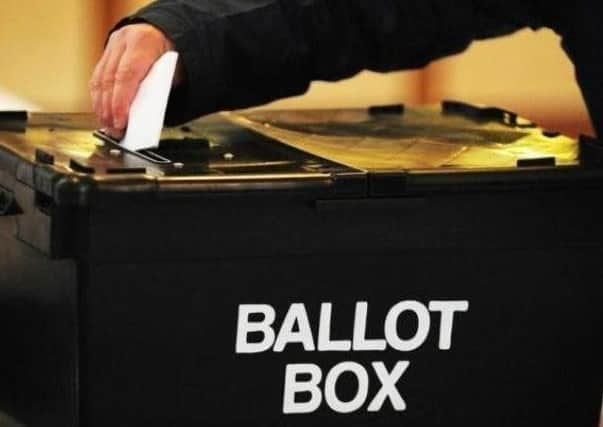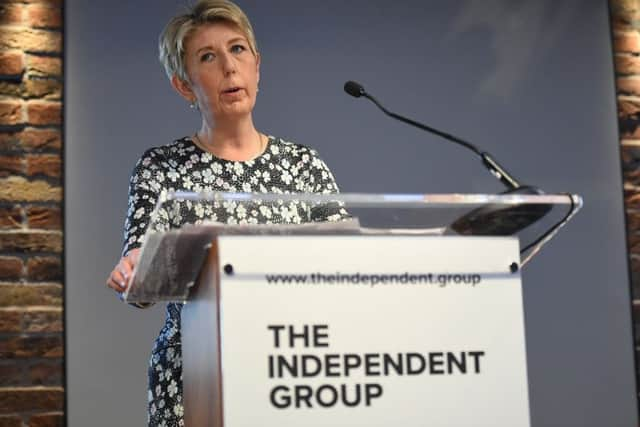Angela Smith: Why I am a late convert to electoral reform after our first past the post voting system failed the nation


In other words, I am happy to admit that I was wrong to defend first past the post for so long. My epiphany came in the wake of the 2017 election, when it became painfully obvious that the current system is no longer fit for purpose.
That was the third election in a row in which our voting system failed to secure the strong, stable government that we all see as its key strength. It gave the Tories just under 50 per cent of the seats available, with 42 per cent of the vote.
Advertisement
Hide AdAdvertisement
Hide AdLet us begin with the deep and ongoing crisis afflicting the two biggest political parties. Brexit is seen by many as the cause, but I would contend that it is a symptom of a newly emboldened populist discourse that has fractured our politics.


As a consequence, both the Tory party and the Labour party are struggling with widening ideological divides that threaten to become an existential threat. That development is important because in a two-party system, voters need to be sure that the party they support is capable of delivering the realistic, pragmatic politics vital to the effective governing of the country. There is a strong sense that both major parties are failing to maintain an approach to policy making based on consensus within each party and with the electorate, because the broad churches they represent are evaporating in the face of a blistering assault from the far reaches of the right and the left.
It is no wonder that long-term trends in voting behaviour indicate that the case for reform of the voting system is getting stronger, not weaker.
The recent British Social Attitudes survey found that only eight per cent of voters identify strongly with a political party. Polls regularly report not only diminishing support for the two parties, but a sense that “none of the above” is an increasingly attractive choice.
Advertisement
Hide AdAdvertisement
Hide AdThat is best expressed by a gradually reducing turnout. In 1950, 84 per cent of voters cast their preferences at the ballot box. In the 2017 election, turnout was 68 per cent. A report by the Institute for Public Policy Research on the 2015 election established that fewer than half of 18-24-year-olds voted, compared with nearly 80 per cent of those aged 65 and over. That is a worrying trend.
The past 30 years have seen the emergence of a dramatic divide in how people vote, especially as far as the age demographic is concerned. The evidence is clear: voters increasingly demonstrate that they no longer trust the two main parties to manage the democratic process.
Both Labour and the Tories have traditionally held a huge responsibility under first past the post. In an electoral process that offers only limited opportunities to change the political colour of a constituency, we have relied on the two major parties to provide candidates capable of taking on the coveted role of Member of Parliament, and to provide a well-thought-through programme for government.
Increasingly there is a feeling that both parties are failing to take those responsibilities seriously, to the extent that voters are no longer content to be managed by political parties. They increasingly seek plurality, so that they can sift for themselves the range of policy choices available in any given election. Voters no longer want to be patronised by the democratic process; they want to be empowered by it.
Advertisement
Hide AdAdvertisement
Hide AdOur 19th century voting system is unfit for the 21st century. As one respondent wrote on the Facebook page accompanying this debate, the system acts as a straitjacket, denying voters the multiplicity of choices they crave.
If we win approval in Parliament for implementing a new PR system, we should begin the process of establishing a proportional system by holding deliberative discussions – citizens’ assemblies – across the country to develop the right option for our country. That is the way we should do this. I am not going to say which system I want to see. The country has to decide which system suits us best. That is the best way of approaching the implementation of a change in the voting system.
I am convinced that change is coming. It is overdue. I apologise for my tardiness in acknowledging the strength of the argument for PR, but better late than never. Let’s get on with it.
Angela Smith is MP for Penistone and Stocksbridge. She represents Change UK after defecting from Labour and led a Parliamentary debate on electoral reform – this is an edited version.